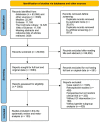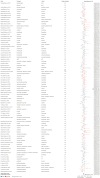The Effect of Sex on the Therapeutic Efficiency of Immune Checkpoint Inhibitors: A Systematic Review and Meta-Analysis Based on Randomized Controlled Trials
- PMID: 38254871
- PMCID: PMC10814446
- DOI: 10.3390/cancers16020382
The Effect of Sex on the Therapeutic Efficiency of Immune Checkpoint Inhibitors: A Systematic Review and Meta-Analysis Based on Randomized Controlled Trials
Abstract
Background: Sex is an important factor influencing the immune system, and the distribution of tumors, including their types and subtypes, is characterized by sexual dichotomy. The aim of this study was to investigate whether there is an association between sex and the treatment effect of immune checkpoint inhibitors (ICI).
Methods: Four bibliographic databases were searched. Studies of randomized controlled trials (RCTs) assessing the efficacy of ICI were identified and used, and the primary endpoint was the difference in efficacy of ICI between males and females, presented as overall survival (OS), progression-free survival (PFS) and recurrence-free survival (RFS). The study calculated the pooled HRs and 95% CIs for OS, PFS and RFS for males and females using a random effects model or a fixed effects model, and thereby assessed the effect of sex on the efficacy of ICI treatment. This study is registered with PROSPERO (CRD42022370939).
Results: A total of 103 articles, including a total of 63,755 patients with cancer, were retrieved from the bibliographic database, of which approximately 70% were males. In studies with OS as the outcome, the combined hazard ratio (HR) was 0.77 (95% CI 0.74-0.79) for male patients treated with ICI and 0.81 (95% CI 0.78-0.85) for female patients compared to controls, respectively. The difference in efficacy between males and females was significant.
Conclusions: ICI therapy, under suitable conditions for its use, has a positive impact on survival in various types of tumors, and male patients benefit more than females. It may be necessary to develop different tumor immunotherapy strategies for patients of different sexes.
Keywords: immune checkpoint inhibitors; immunotherapy; meta-analysis; randomized controlled study; sex.
Conflict of interest statement
The authors declare no conflicts of interest.
Figures




Similar articles
-
Impact of Age on the Efficacy of Immune Checkpoint Inhibitor-Based Combination Therapy for Non-small-Cell Lung Cancer: A Systematic Review and Meta-Analysis.Front Oncol. 2020 Sep 23;10:1671. doi: 10.3389/fonc.2020.01671. eCollection 2020. Front Oncol. 2020. PMID: 33072551 Free PMC article.
-
Liver metastases and the efficacy of immune checkpoint inhibitors in advanced lung cancer: A systematic review and meta-analysis.Front Oncol. 2022 Oct 18;12:978069. doi: 10.3389/fonc.2022.978069. eCollection 2022. Front Oncol. 2022. PMID: 36330494 Free PMC article.
-
Association Between Efficacy of Immune Checkpoint Inhibitors and Sex: An Updated Meta-Analysis on 21 Trials and 12,675 Non-Small Cell Lung Cancer Patients.Front Oncol. 2021 Aug 26;11:627016. doi: 10.3389/fonc.2021.627016. eCollection 2021. Front Oncol. 2021. PMID: 34513654 Free PMC article.
-
A meta-analysis and real-world cohort study on the sex-related differences in efficacy and safety of immunotherapy for hepatocellular carcinoma.JHEP Rep. 2023 Dec 12;6(2):100982. doi: 10.1016/j.jhepr.2023.100982. eCollection 2024 Feb. JHEP Rep. 2023. PMID: 38274490 Free PMC article.
-
An Up-To-Date Investigation Into the Correlation Between Proton Pump Inhibitor Use and the Clinical Efficacy of Immune Checkpoint Inhibitors in Advanced Solid Cancers: A Systematic Review and Meta-Analysis.Front Oncol. 2022 Feb 24;12:753234. doi: 10.3389/fonc.2022.753234. eCollection 2022. Front Oncol. 2022. PMID: 35280736 Free PMC article.
Cited by
-
Immune-Related Adverse Events in a Patient Treated with Pembrolizumab: A Case Report from the Point of View of a Geriatrician.Geriatrics (Basel). 2024 Dec 11;9(6):160. doi: 10.3390/geriatrics9060160. Geriatrics (Basel). 2024. PMID: 39727819 Free PMC article.
-
Personalization of Cancer Treatment: Exploring the Role of Chronotherapy in Immune Checkpoint Inhibitor Efficacy.Cancers (Basel). 2025 Feb 21;17(5):732. doi: 10.3390/cancers17050732. Cancers (Basel). 2025. PMID: 40075580 Free PMC article. Review.
References
Publication types
LinkOut - more resources
Full Text Sources

